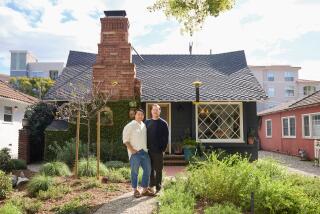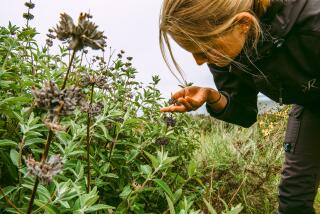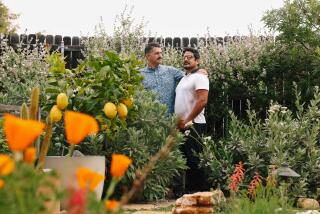Tara Kolla, L.A’s down-to-earth urban farmer
Tara Kolla was born in Inglewood but grew up in Europe. She came back to Los Angeles, to a half-acre Silver Lake plot, where she decided to try her hand at “urban farming.” Her neighbors objected, so now she mostly works other people’s land, and works to further the cause. We met in Hidden Canyon, the aptly named acres in Glassell Park whose owners invited Kolla to cultivate and grow market flowers. Here are rows and beds of hyssop, black-eyed Susans, honeywort, zinnias, mums and ornamental cotton flowers. I plucked a boll of what I’ll call “Glassell Park long staple.” Because of people like Kolla, laws have changed to permit farming, of a sort, all around town. What was once the single most profitable agricultural county in the nation may just be coming back, one urban plot at a time.
What’s happening around us here?
When the owners heard what I was doing, they invited me to grow here. We do this: We take over pieces of land and work the soil, bring in compost, bring in mulch, bring in a drip-irrigation system, and we plant and we tend. We don’t use chemicals; we harvest the flowers; we take them to market and sell them to our community. The reward for the homeowner is this beautiful thing, and it’s their part in doing their bit toward stewardship, so people feel good about that.
That covers costs and keeps us ticking along. We’re offering now a seed-to-ceremony program. Brides can come to us and tell us when their weddings are, usually a year out, and then we’ll grow [flowers] for their wedding. It’s something brand new.
Did you study to be a botanist?
No, I was a tech girl! That was my background. That house [in Silver Lake] changed everything. I took botany at Pierce College. I went to Oregon to study soils. I fell in love with it. [I’m] a country girl at heart, I think. I grew up in France and Ireland and England: rolling hills, seasonal color change, red poppies in September and yellow fields in autumn. [In Silver Lake I] rented a tiller from Home Depot and tilled. It ended up being this big flat field, and I looked at it and thought, this has got to work for itself. And that was 10 or 11 years ago.
Why was there resistance?
I was teaching classes to small groups; I had something like nine classes in two years. I used my place because everything was there: the composting, the soil, the mulching, the seedlings. I had a strict policy of no parking on the street, and most [students] walked or cycled. The only time they came up in a car was to take home something heavy, compost or a pot. Neighbors complained, and the city said I had to stop. I had to find another venue.
So I created this darling little garden at Norman Harriton/Franklin Hills community garden, planted it, mounded it, started teaching kids there on Wednesdays. [My Silver Lake] neighbors [who also happened to own property near the community garden] filed a complaint saying why is she teaching commercially there? It was a witch-hunt. They reported me for composting [at my house]. I was going to a restaurant in Atwater to pick up bins of kitchen scraps and working them into the compost. It was illegal to compost materials I did not generate on my own site. The city operates based on complaints, and so they had to do something, but I don’t think they really wanted to shut me down.
What’s behind this thinking is the assumption that these things cause traffic, are smelly, are unhealthy. It’s not the case because people have been doing this for centuries and we’re still here.
How does that notion get changed? L.A. used to have thousands of home truck gardens.
By changing little laws one at a time. All this nonsense created the opportunity for the [municipal] Food and Flowers Freedom Act. It now allows anybody in the city to sell off-site homegrown fruit, flowers, fibers and vegetables. It’s an extension of the Truck Gardening Ordinance, which had been in place since 1946 but which just said “vegetables.” All we did was be specific.
And now a state law, AB 1616, allows people to make certain foods at home to sell off-site.
Baked goods, preserves, jams, jellies, dehydrated products, anything that will sit on the countertop and not spoil — you can prepare those in your own kitchen and sell them. There are artisans out there, people using old recipes in their families, who need a bit of extra income. All the great fruit I grow at home, I can turn into jams and sell that. We have beautiful plums, apricots, nectarines, guavas, mangoes, pomegranates, figs, raspberries, blackberries. I’m cuckoo about growing things.
Yet Proposition 37, the labeling requirement for genetically modified food ingredients, lost.
How ironic that AB 1616 passes, allowing people to make and sell healthy local foods. We have to label them when we make things in our kitchen and sell them. Why do we have to be that transparent, but Nestle, Kraft, Coca-Cola — why don’t they?
Sustainable Economic Enterprises of Los Angeles, or SEELA, operates farmers markets in Hollywood, Atwater Village, Echo Park and Watts. The Watts market operates at a loss and they let it, because SEELA is not going to give up. Why is that market not doing well? Because people in the area are buying food that’s cheaper because it’s subsidized by the government and companies that funded no-on-37 — Monsanto, Dow, Kraft, all those companies.
Are a lot of city dwellers “farming”?
There’s a huge movement. See what these nice girls are doing [she points to the women working in the flower beds]? You can only go at a certain pace. It slows you down and it connects you and it feels really good.
How does one go from puttering in the garden to a small business?
Practice practice practice! There has to be a spirit of entrepreneurship in you, but it’s fun. You just have to step off the ledge and do it. My first day at market, I sold nine bunches of sweet peas. It was really humbling to go from my previous career to standing at market with a poxy little table and a beaten-up umbrella and my nine bunches. $45. After the high-tech stuff I was doing.
Will people pay more for local organic flowers as they do for food? You see “CA grown” stickers on flowers in places like Sam’s Club.
That’s been a push by the Assn. of Specialty Cut Flower Growers in California — I’m a member — to help California flower growers get back some of the business from the Andean countries, because most of the production went south after NAFTA. People want local. But I went to two different florists and said, “I’ve got an excess of ranunculus, anemones and sweet peas.” They said, “How much?” I gave them my price, and they said, “Phoo, no, we’re gonna pay you much less.” I was, “No, no, I’ve got to survive, I’ve got people to pay, we don’t have slave labor here, we don’t use chemicals.” They said: “Customers don’t want organic.” I said: “What planet are you on?”
Can a “Los Angeles” food or flower label have cachet?
Yeah, because we think of this as a concrete city, and the reality is different.
Is there terroir here? Silver Lake soil and seasons versus Santa Monica soil?
It’s a 10-degree difference. A clearer distinction is going to happen between what’s grown in the Valley and what’s grown on the ocean side. One thing I do to [pay] overhead is maintain [other people’s] vegetable gardens. In Altadena, tomato plants are still thriving. In Malibu, done. See how much sky we have here? [In Silver Lake], it’s more sheltered and moist.
So there are microclimates?
They’re really distinct.
What about soil quality?
It’s really spotty. Particularly for food, it’s critical that you test your soil, for lead, for toxicity.
People laughed at you when you began all this.
[They thought], “You can’t make any money.” Now that the legal hurdles to urban farming seem to have dissipated, and it seems I have a clear road ahead, the challenge is, can I actually do it? Can I prove that urban farming is a viable small-business option? Can I pay these people and pay myself, and cover the mortgage? I feel the challenge is now a personal one.
Follow Patt Morrison on Twitter @pattmlatimes
This interview was edited and excerpted from a taped transcript. An archive of Morrison’s interviews can be found at latimes.com/pattasks.
More to Read
A cure for the common opinion
Get thought-provoking perspectives with our weekly newsletter.
You may occasionally receive promotional content from the Los Angeles Times.







